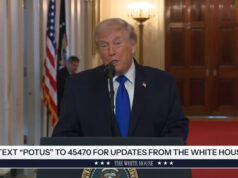
BY BRENDAN FARRINGTON
Florida will have one of the country’s most restrictive social media bans for minors — if it withstands expected legal challenges — under a bill signed by Republican Florida Gov. Ron DeSantis on Monday.
The bill will ban social media accounts for children under 14 and require parental permission for 15- and 16-year-olds. It was slightly watered down from a proposal DeSantis vetoed earlier this month, a week before the annual legislative session ended.
The new law was Republican Speaker Paul Renner’s top legislative priority. It takes effect Jan. 1.
“A child in their brain development doesn’t have the ability to know that they’re being sucked into these addictive technologies and to see the harm and step away from it, and because of that we have to step in for them,” Renner said at the bill-signing ceremony held at a Jacksonville school.
The bill DeSantis vetoed would have banned minors under 16 from popular social media platforms regardless of parental consent. But before the veto, he worked out compromise language with Renner to alleviate the governor’s concerns and the Legislature sent DeSantis a second bill.
Several states have considered similar legislation. In Arkansas, a federal judge blocked enforcement of a law in August that required parental consent for minors to create new social media accounts.
Supporters in Florida hope the bill will withstand legal challenges because it would ban social media formats based on addictive features such as notification alerts and auto-play videos, rather than on their content.
Renner said he expects social media companies to “sue the second after this is signed. But you know what? We’re going to beat them. We’re going to beat them and we’re never, ever going to stop.”
DeSantis also acknowledged the law will be challenged on First Amendment issues, and bemoaned the fact the “Stop Woke Act” he signed into law two years ago was recently struck down by an appeals court with a majority of Republican-appointed judges. They ruled it violated free speech rights by banning private businesses from including discussions about racial inequality in employee training.
“Any time I see a bill, if I don’t think it’s constitutional, I veto it,” said DeSantis, a lawyer, expressing confidence that the social media ban will be upheld. “We not only satisfied me, but we also satisfied, I think, a fair application of the law and Constitution.”
The bill overwhelmingly passed both chambers, with some Democrats joining a majority of Republicans who supported the measure. Opponents argued it is unconstitutional and government shouldn’t interfere with decisions parents make with their children.
“This bill goes too far in taking away parents’ rights,” Democratic Rep. Anna Eskamani said in a news release. “Instead of banning social media access, it would be better to ensure improved parental oversight tools, improved access to data to stop bad actors, alongside major investments in Florida’s mental health systems and programs.”
Disclaimer
Artificial Intelligence Disclosure & Legal Disclaimer
AI Content Policy.
To provide our readers with timely and comprehensive coverage, South Florida Reporter uses artificial intelligence (AI) to assist in producing certain articles and visual content.
Articles: AI may be used to assist in research, structural drafting, or data analysis. All AI-assisted text is reviewed and edited by our team to ensure accuracy and adherence to our editorial standards.
Images: Any imagery generated or significantly altered by AI is clearly marked with a disclaimer or watermark to distinguish it from traditional photography or editorial illustrations.
General Disclaimer
The information contained in South Florida Reporter is for general information purposes only.
South Florida Reporter assumes no responsibility for errors or omissions in the contents of the Service. In no event shall South Florida Reporter be liable for any special, direct, indirect, consequential, or incidental damages or any damages whatsoever, whether in an action of contract, negligence or other tort, arising out of or in connection with the use of the Service or the contents of the Service.
The Company reserves the right to make additions, deletions, or modifications to the contents of the Service at any time without prior notice. The Company does not warrant that the Service is free of viruses or other harmful components.












